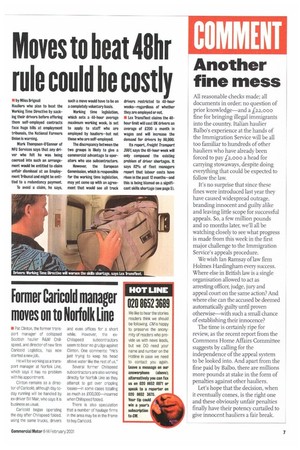Moves to beat 48hr rule could be costly
Page 9

If you've noticed an error in this article please click here to report it so we can fix it.
by Miles Brignall Hauliers who plan to beat the Working Time Directive by sacking their drivers before offering them self-employed contracts face huge bills at employment tribunals, the National Farmers Union is warning.
Mark Thompson-O'Connor of NFU Services says that any driver who felt he was being coerced into such an arrangement would be entitled to claim unfair dismissal at an Employment Tribunal and might be entitled to a redundancy payment.
To avoid a claim, he says. such a move would have to be on a completely voluntary basis.
Working time legislation, which sets a 48-hour average maximum working week, is set to apply to staff who are employed by hauliers—but not those who are self-employed.
The discrepancy between the two groups is likely to give a commercial advantage to operators who use subcontractors.
However, the European Commission, which is responsible for the working time legislation, may yet come up with an agreement that would see all truck drivers restricted to 48-hour weeks—regardless of whether they are employed or not.
a Lox Transfleet claims the 48hour limit will cost UK drivers an average of £200 a month in wages and will increase the demand for drivers by 80,000.
Its report, freight Transport 2001, says the 48-hour week will only compound the existing problem of driver shortages. It says 82% of fleet managers report that labour costs have risen in the past 12 months—and this is being blamed on a significant skills shortage (see page 5).
































































































